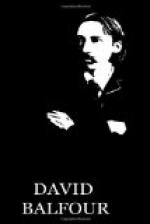I had done better to have instantly refused, but in truth I was beside the power of reasoning; did as I was bid; took my leave I know not how; and when I was forth again in the close, and the door had shut behind me, was glad to lean on a house wall and wipe my face. That horrid apparition (as I may call it) of Mr. Symon rang in my memory, as a sudden noise rings after it is over on the ear. Tales of the man’s father, of his falseness, of his manifold perpetual treacheries, rose before me from all that I had heard and read, and joined on with what I had just experienced of himself. Each time it occurred to me, the ingenious foulness of that calumny he had proposed to nail upon my character startled me afresh. The case of the man upon the gibbet by Leith Walk appeared scarce distinguishable from that I was now to consider as my own. To rob a child of so little more than nothing was certainly a paltry enterprise for two grown men; but my own tale, as it was to be represented in a court by Symon Fraser, appeared a fair second in every possible point of view of sordidness and cowardice.
The voices of two of Prestongrange’s liveried men upon his doorstep recalled me to myself.
“Ha’e,” said the one, “this billet as fast as ye can link to the captain.”
“Is that for the cateran back again?” asked the other.
“It would seem sae,” returned the first. “Him and Symon are seeking him.”
“I think Prestongrange is gane gyte,” says the second. “He’ll have James More in bed with him next.”
“Weel, it’s neither your affair nor mine’s,” says the first.
And they parted, the one upon his errand, and the other back into the house.
This looked as ill as possible. I was scarce gone and they were sending already for James More, to whom I thought Mr. Symon must have pointed when he spoke of men in prison and ready to redeem their lives by all extremities. My scalp curdled among my hair, and the next moment the blood leaped in me to remember Catriona. Poor lass! her father stood to be hanged for pretty indefensible misconduct. What was yet more unpalatable, it now seemed he was prepared to save his four quarters by the worst of shame and the most foul of cowardly murders—murder by the false oath; and to complete our misfortunes, it seemed myself was picked out to be the victim.
I began to walk swiftly and at random, conscious only of a desire for movement, air, and the open country.
* * * * *
CHAPTER VII
I MAKE A FAULT IN HONOR




